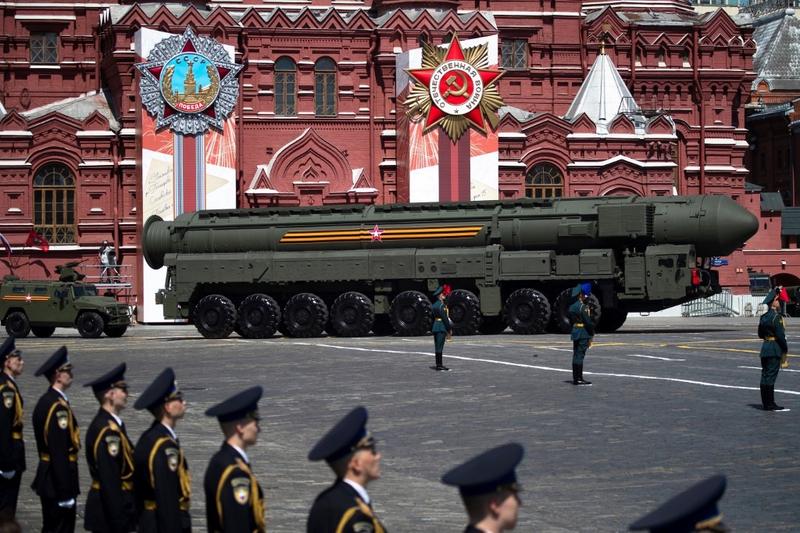 In this file photo dated June 24, 2020 Russian army RS-24 Yars ballistic missile system moves through Red Square during a military parade, marking the 75th anniversary of the Soviet victory over Nazi Germany in World War Two, in Moscow on June 24, 2020. US President Joe Biden's administration on Feb 3, 2021 extended the New START nuclear treaty with Russia by five years, one day before the treaty was set to expire. (PAVEL GOLOVKIN/ POOL / AFP)
In this file photo dated June 24, 2020 Russian army RS-24 Yars ballistic missile system moves through Red Square during a military parade, marking the 75th anniversary of the Soviet victory over Nazi Germany in World War Two, in Moscow on June 24, 2020. US President Joe Biden's administration on Feb 3, 2021 extended the New START nuclear treaty with Russia by five years, one day before the treaty was set to expire. (PAVEL GOLOVKIN/ POOL / AFP)
WASHINGTON / MOSCOW - The United States on Wednesday extended the New Strategic Arms Reduction Treaty (New START) with Russia for five years, said US Secretary of State Antony Blinken.
The New START, which limits the numbers of deployed strategic nuclear warheads to 1,550 and delivery systems to 700 for each, is the last remaining nuclear arms control pact in force between the two nuclear superpowers
"Extending the New START Treaty ensures we have verifiable limits on Russian ICBMs, SLBMs, and heavy bombers until February 5, 2026," said Blinken, adding that the extension "makes the United States, US allies and partners, and the world safer."
"Especially during times of tension, verifiable limits on Russia's intercontinental-range nuclear weapons are vitally important," he said.
ALSO READ: US, Russian envoys tight-lipped as arms control talks START
"The New START treaty will operate in the form it was signed, without any changes or additions, until February 5, 2026," the Russian foreign ministry said in a statement.
Blinken noted that Washington would use the five-year extension period to seek arms control with Moscow that addresses all of the Russian nuclear weapons.
The New START, which limits the numbers of deployed strategic nuclear warheads to 1,550 and delivery systems to 700 for each, is the last remaining nuclear arms control pact in force between the two nuclear superpowers.
The treaty can be extended by a maximum of five years with the consent of the two countries.
The former Trump administration tried to conclude a shorter extension of the treaty last year after rounds of negotiation with Russia, but the two sides failed to finalize a formal agreement.
Immediately after taking office, President Joe Biden proposed a full five-year extension of the treaty that expires on Feb 5, a move welcomed by the Kremlin.
Russian President Vladimir Putin last Friday signed a bill into law ratifying a five-year extension of the New START with the United States.
READ MORE: Putin says 'Russia is ready to extend the New START treaty'
The extension of the New START might be a bright spot for the US-Russia relations, but the overall tensions between Washington and Moscow are unlikely to decrease given their differences on issues of human rights, Ukraine, cybersecurity as well as their mutual accusation of interference in the domestic politics.
"We hope that the understanding reached with Washington regarding the fate of the landmark treaty for international security will help overcome the tendency that has prevailed in recent years as a result of the destructive U.S. policy on breaking arms control and nonproliferation mechanisms," the Russian foreign ministry emphasized.
The United Nations on Wednesday welcomed the extension. "From our point of view, we encourage both Russia and the United States to use these next five years to negotiate further reductions in their nuclear weapons, as well as new agreements that can address the emerging nuclear weapons challenges of our time and make the world a better place," Stephane Dujarric, spokesman for UN Secretary-General Antonio Guterres said at a daily press briefing at the United Nations.


